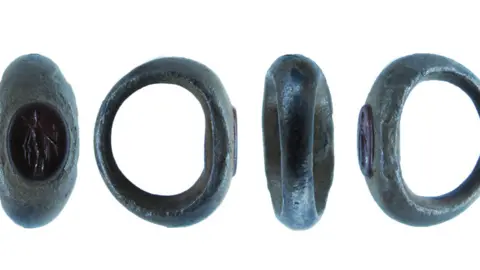Chelmsford: Roman Apollo ring with links to Snettisham hoard found
 Colchester and Ipswich Museum Service
Colchester and Ipswich Museum ServiceA silver ring unearthed in an Essex field may be connected to a famous Roman jeweller's hoard found in Norfolk in 1985, a historian has said.
The ring is inset with a carnelian carving of the god Apollo. It was found by a metal detectorist near Chelmsford.
Its 2nd Century wearer would have hoped for the god's protection, Essex finds liaison officer Lori Rogerson said.
The ring seemed to be from the same workshop as the Snettisham hoard of carved gemstones, she added.
The large hoard was found buried in a pot during building work and included 110 unmounted gemstone intaglios - carved gemstones used as seals - silver jewellery and ingots, 110 coins and tools, Its contents are now at the British Museum.
Miss Rogerson said the way it had been carved using long strokes and the fact it dated from AD125 to 175 suggested a connection to the Norfolk hoard.
 Colchester and Ipswich Museum Service
Colchester and Ipswich Museum ServiceThe ring would have been used as a seal to sign documents by "literate men and women in wider Romano-British society which grew around military towns... leaving an impression of the engraved image in wax", she added.
But it would also have been a "very personal" object.
"We know these people would have had a very close personal relationship with their gods and goddesses," she said.
"Apollo, being the god of healing and prophecy, would hopefully have protected the wearer from harm or illness.
"It's also really interesting because it's evidence of a pagan religion that has its roots in Ancient Greece being worshipped by Romano-British society."
Another ring unearthed at Upper Winchendon, near Aylesbury, Buckinghamshire, in 2018 is also believed to have links to the Snettisham workshop.
The Essex ring was declared treasure by a coroner and Chelmsford Museum hopes to acquire it.

Find BBC News: East of England on Facebook, Instagram and Twitter. If you have a story suggestion email [email protected]
